Antibody data
- Antibody Data
- Antigen structure
- References [0]
- Comments [0]
- Validations
- Immunocytochemistry [2]
- Immunoprecipitation [1]
- Immunohistochemistry [4]
- Other assay [1]
Submit
Validation data
Reference
Comment
Report error
- Product number
- PA5-51560 - Provider product page

- Provider
- Invitrogen Antibodies
- Product name
- Syntaxin 4 Polyclonal Antibody
- Antibody type
- Polyclonal
- Antigen
- Recombinant protein fragment
- Description
- Immunogen sequence: MRDRTHELRQ GDDSSDEEDK ERVALVVHPG TARLGSPDEE FFHKVRTIRQ TIVKLGNKVQ ELEKQQVTIL ATPLPEESMK QELQNLRDEI KQLGREIRLQ LKAIEPQKEE ADENYNSVNT RMRKTQHGVL SQQFVELINK CNSMQSE Highest antigen sequence identity to the following orthologs: Mouse - 86%, Rat - 86%.
- Reactivity
- Human
- Host
- Rabbit
- Isotype
- IgG
- Vial size
- 100 μL
- Concentration
- 0.3 mg/mL
- Storage
- Store at 4°C short term. For long term storage, store at -20°C, avoiding freeze/thaw cycles.
No comments: Submit comment
Supportive validation
- Submitted by
- Invitrogen Antibodies (provider)
- Main image
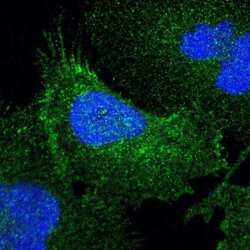
- Experimental details
- Immunofluorescent staining of STX4 in human cell line U-251 MG shows positivity in plasma membrane. Samples were probed using a STX4 Polyclonal Antibody (Product # PA5-51560).
- Submitted by
- Invitrogen Antibodies (provider)
- Main image
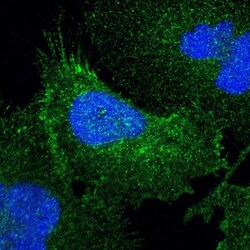
- Experimental details
- Immunofluorecent analysis of Syntaxin 4 in human cell line U-251 MG using Syntaxin 4 Polyclonal Antibody (Product # PA5-51560). Staining shows localization to plasma membrane.
Supportive validation
- Submitted by
- Invitrogen Antibodies (provider)
- Main image
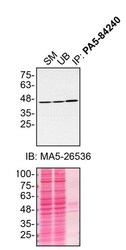
- Experimental details
- Immunoprecipitation of Syntaxin-4 was performed on HAP1 cell lysates. Antibody-bead conjugates were prepared by adding 2 µg of STX4 polyclonal antibody (Product # PA5-51560) with 30 µL of protein A-Sepharose beads and rocked overnight at 4°C. 500 µg of lysate was incubated with an antibody-bead conjugate for 2 hours at 4°C. Following centrifugation and multiple washes, 10% starting material (SM), 10% unbound fraction (UB) and immunoprecipitated fraction (IP) were processed for immunoblot using the same antibody. Ponceau stained transfer of blot is shown. Data courtesy of YCharOS Inc., an open science company with the mission of characterizing commercially available antibodies using knockout validation.
Supportive validation
- Submitted by
- Invitrogen Antibodies (provider)
- Main image
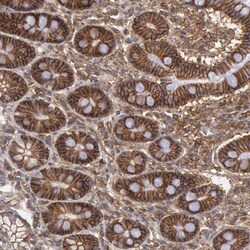
- Experimental details
- Immunohistochemical analysis of Syntaxin 4 in human gastrointestinal using Syntaxin 4 Polyclonal Antibody (Product # PA5-51560) shows strong membranous positivity in glandular cells.
- Submitted by
- Invitrogen Antibodies (provider)
- Main image
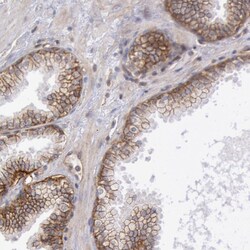
- Experimental details
- Immunohistochemical analysis of Syntaxin 4 in human prostate using Syntaxin 4 Polyclonal Antibody (Product # PA5-51560) shows strong membranous positivity in glandular cells.
- Submitted by
- Invitrogen Antibodies (provider)
- Main image
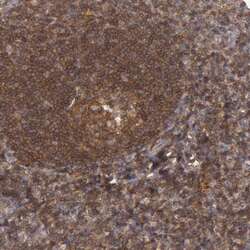
- Experimental details
- Immunohistochemical analysis of Syntaxin 4 in human lymphoid tissues using Syntaxin 4 Polyclonal Antibody (Product # PA5-51560) shows strong membranous positivity in germinal center cells.
- Submitted by
- Invitrogen Antibodies (provider)
- Main image
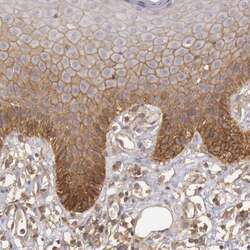
- Experimental details
- Immunohistochemical staining of STX4 in human skin using a STX4 Polyclonal Antibody (Product # PA5-51560) shows membranous positivity in epidermal cells.
Supportive validation
- Submitted by
- Invitrogen Antibodies (provider)
- Main image
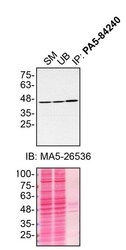
- Experimental details
- Immunoprecipitation of Syntaxin-4 was performed on HAP1 cell lysates. Antibody-bead conjugates were prepared by adding 2 µg of STX4 polyclonal antibody (Product # PA5-51560) with 30 µL of protein A-Sepharose beads and rocked overnight at 4°C. 500 µg of lysate was incubated with an antibody-bead conjugate for 2 hours at 4°C. Following centrifugation and multiple washes, 10% starting material (SM), 10% unbound fraction (UB) and immunoprecipitated fraction (IP) were processed for immunoblot using the same antibody. Ponceau stained transfer of blot is shown. Data courtesy of YCharOS Inc., an open science company with the mission of characterizing commercially available antibodies using knockout validation.
 Explore
Explore Validate
Validate Learn
Learn Western blot
Western blot Immunocytochemistry
Immunocytochemistry